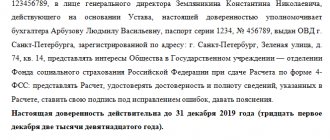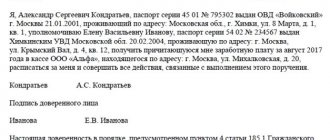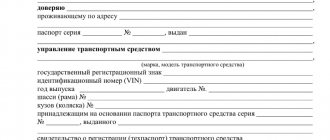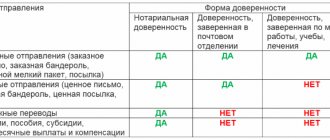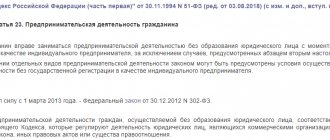Do you need a reason?
The power of attorney has such a name because it is designed for a certain amount of trust of both parties in each other. If an individual or company entrusts someone to act in its place for any authorized action, it has the right to terminate this opportunity at any time.
There can be many reasons for this, for example:
- loss of trust
- termination of contractual relations,
- termination of contract, etc.
But the principal is not obliged to voice them either to the notary or to his representative, since the granting of powers from the point of view of the law is a one-sided transaction.
To terminate a power of attorney, the expressed will of the person who issued it is sufficient and the procedure is carried out completely according to the law - in accordance with Art. 188, 189 of the Civil Code of the Russian Federation.
REFERENCE! The procedure for revoking a power of attorney is enshrined in clause 10 of the Methodological Recommendations for Certifying Powers of Attorney, approved by the decision of the Federal Notary Chamber of July 7-08, 2003, Protocol No. 03/03.
Procedure for revoking a power of attorney
It would be more correct to call such an action not “revocation of a power of attorney,” but “cancellation of authority.” Since the result of such an action will be precisely the termination of the representation.
To complete this procedure, you cannot do without a notary who certified the issued power of attorney. What needs to be done by the principal who wishes to cancel this document:
- write a statement in which you notify the notary of your will to terminate the power of attorney;
- decide on who will notify the representative about the termination of his right - you yourself or a notary;
- if you decide to use the help of a notary to notify a representative, the representative of the law himself will send out official notices;
- after the notary has sent the notices, he will provide you with evidence that the notice was served;
- it is necessary to notify not only the representative, but also all possible “addressees” who were supposed to be presented with a power of attorney to act on behalf of the guarantor;
- a note on the revocation of the power of attorney in a special notary register (made by a notary);
- the power of attorney is returned by the recipient to the person who issued it.
IMPORTANT! If it is impossible to accurately determine the scope of the possible validity of the power of attorney or it is too broad, that is, targeted notification of third parties is impossible, you need to notify them through the media. To do this, you need to place the relevant information in the Kommersant newspaper. This does not cancel the obligation to personally notify the guarantor himself.
Grounds for termination of a power of attorney
According to Article 188 of the Civil Code of the Russian Federation, a power of attorney may be terminated if:
- The power of attorney has expired.
- The power of attorney can be terminated by the person who issued it (the principal).
- The authorized representative has renounced the powers specified in the power of attorney.
- The legal entity that issued the power of attorney or acted as a representative ceased its activities and was excluded from the register of legal entities.
- The citizen who issued the power of attorney has died or been officially declared incompetent, partially capable or missing.
- The principal or proxy has been declared bankrupt and has lost the right to issue powers of attorney.
The principal, as well as the authorized representative, can terminate the power of attorney at any time. In this case, it is mandatory to notify the representative or principal of your decision in case of refusal of the power of attorney.
Responsibility of the principal
Notification of all persons affected by the revoked power of attorney is a mandatory element of this procedure for the principal. If this condition is not met, unpleasant consequences are possible.
Sending notices of termination of the powers of the guarantor is, by law, the obligation of the principal, and not his right.
If the representative of the revoked license performs on behalf of the principal any actions for which he no longer has the right, and third parties have not received notification of this (in writing or through the media), then they will not bear any responsibility for all the consequences of the actions taken.
Everything that the guarantor does will be the personal responsibility of the principal who neglected his duties, including possible illegal actions, for which the person who issued the power of attorney will also have to answer.
In addition, if the principal violated the notification regime, and the guarantor. Without knowing anything about the revocation of the power of attorney, he performed some actions within the framework of the previously granted powers and at the same time incurred certain expenses, the principal is obliged to reimburse them in full.
How to revoke a power of attorney issued in another city
The law allows you to cancel a trust document, even if it was drawn up in another city. In fact, this procedure is no different from ordinary actions. Here you will also need:
- Notify the authorized representative;
- Notify all persons to whom the power of attorney was presented about the cancellation. These can be both individuals and companies;
- Receive a power of attorney back from the representative;
- If the revocation of the power of attorney is published in an official publication, then after a month it will be considered that third parties have been notified.
Cancel power of attorney for a car
Today, in order to drive someone else's car, there is no need to have a power of attorney. However, you cannot do without this document if you need to perform any actions on the machine. To revoke this trust document, the owner of the car must contact the traffic police. Here you need to indicate that the authorized person has lost the ability to register the vehicle, pick it up from the impound lot, and perform other actions.
It is also necessary to contact the trusted person himself. You need to not only inform him about the cancellation of the power of attorney, but also get this document back. If the representative has insurance and vehicle insurance on hand, they must also be returned to the owner of the car.
When does document cancellation take effect?
Many people wonder at what point exactly can a trust document be considered invalid? Some argue that the revocation begins to take effect from the moment it is drawn up and signed by the principal. However, it is not. It is logical to assume that the annulment should take effect no earlier than the moment when the attorney and third parties are familiar with it. Although it is important to understand here, the representative and third parties usually receive notice of cancellation at different times. Therefore, for each of them, the beginning of the cancellation effect may be different.
The effect of the canceling document begins from the moment it is received by the addressee. There is no need to be confused here, because the addressee may receive a notification, but not read it. In other words, if there is confirmation that the addressee received the notice, for example, upon receipt of a registered letter, then such cancellation is already in effect. Moreover, it does not matter why the addressee did not read and familiarize himself with the notification received.
If it is not possible to contact third parties, you need to use the official publication “Kommersant”, where the corresponding announcement is placed. In this case, the cancellation of the power of attorney for third parties begins 30 days after publication of the announcement.
Article Rating
Guarantor and return of power of attorney
The refusal of the guarantor, notified of the cancellation of the power of attorney, to return it to the principal is a reason to contact law enforcement agencies: legally, this can be regarded as an attempt at fraud. You can first draw up an act of refusal to return the power of attorney and make a note on it about the guarantor’s refusal to sign it, if it follows. Signatures of witnesses to this action will be required.
What if the representative disappears? In cases where the representative avoids contact and his whereabouts are unknown, it would be legally correct to send a notice of revocation of the power of attorney to any of the addresses previously specified by him, making sure to keep the delivery notice. From the point of view of the law, it will be considered received.
FOR YOUR INFORMATION! Third parties are not obliged to verify the good faith of the guarantor and the validity of the power of attorney. All responsibility lies with the principal.
What if the power of attorney was not certified by a notary?
The law allows the drawing up of a power of attorney in simple written form. Revocation of such a power of attorney is simpler, since it only involves sending a written notice to the guarantor about the termination of his powers, after which the trust document must return to the person who issued it. In order to protect yourself from possible risks, it is better to take care of confirmation of receipt of this notification in advance: the easiest way is to send a postal item with acknowledgment of receipt or ask the recipient for a receipt.
What to pay attention to
With the termination of the power of attorney, the sub-power of attorney, if it was provided for, also loses force.
In order to protect yourself from the actions of an attorney whose services you decide to refuse, you must notify all possible authorities with which the representative may enter into legal relations on your behalf that the representative’s powers have been revoked. For example, if you cancel a power of attorney to sell an apartment, send a corresponding notification to the regional office of Rosreestr.
If the representative refuses to return the canceled document to the principal and continues to carry out actions on his behalf, such actions may be regarded as fraudulent.
The validity of the power of attorney does not terminate due to a change in the head of the legal entity. In this case, there is no need to re-sign the document with the new boss. And if the new management wants to terminate the powers delegated by the previous director, then they should simply be canceled.
Subtleties of revoking authority
In practice, there are many different nuances that persons who issued a power of attorney may encounter. Let's try to look at the most common cases and give recommendations on effective and legally correct actions.
- A power of attorney has been issued to several persons, but only one or some of the powers need to be revoked. In such a sensitive situation, notifications must be sent to all persons specified in the power of attorney, as well as to the circle for which it is intended. The text of the notification must clearly indicate whose powers are being abolished. In this case, it does not matter whether all the representatives named in the document acted together or separately: the rights remain only with those remaining.
- Limitation of powers. If you do not want to completely terminate the power of attorney, but cancel only certain powers, then the notice must describe in detail which actions the guarantor no longer has the right to do and which remain in force. When rights are limited, the guarantor does not return the power of attorney, and there is a risk that he will want to use the full scope of representation. Therefore, it is recommended to cancel the power of attorney completely. And then issue the representative a new one - with a limited range of powers.
- Cancellation of reassignment. The law allows the guarantor, in turn, to issue a power of attorney to someone else, while the first principal may not know either about this fact or about the identity of the guarantor. If the primary principal does not want to allow this, he must revoke this authority by informing the guarantor in the prescribed manner. If the power of attorney is canceled by the primary principal, the right of sub-authorization is automatically lost, which the principal must inform not only the guarantor, but also the sub-guarantor. If the subguarantor is unknown to the primary guarantor, responsibility for notifying him falls on the person who issued the right of subrogation. If the substitute (guarantor) has not received such notification, the law protects his conscientious actions - according to paragraph 2 of Article 189 of the Civil Code of the Russian Federation, if he presented to third parties a power of attorney, the cancellation of which they were not notified, the principal is obliged to recognize the rights and obligations.
- Cancellation of a power of attorney for an employee. If an organization has issued a power of attorney to its employee and wishes to revoke it, it is first necessary to issue an internal order with which the deprived guarantor is familiarized with the visa. It is also necessary to act if the guarantor employee resigns.
- The company that issued the power of attorney is liquidated. In this case, the validity of all powers of attorney is terminated by itself. The counterparties will receive notifications in the order of liquidation of the enterprise.
- Other grounds for termination of a power of attorney that do not require its revocation are expiration of the term, death of the principal or guarantor, as well as other cases provided for in Article 188 of the Civil Code of the Russian Federation.
1.6. Termination of power of attorney
In accordance with paragraph 1 of Art. 188 of the Civil Code of the Russian Federation, the grounds for termination of a power of attorney are :
1) Expiration of the power of attorney.
2) Cancellation of the power of attorney by the represented . The person who issued the power of attorney may cancel it at any time (clause 2 of Article 188 of the Civil Code of the Russian Federation), with the exception of an irrevocable power of attorney , for which the law establishes special cases of its cancellation (Article 188.1 of the Civil Code of the Russian Federation). If the power of attorney was issued jointly, then any of the represented persons has the right to revoke its validity. If the remaining persons who issued the joint power of attorney wish to retain the powers of the representative, a new power of attorney must be issued. Moreover, if a power of attorney was issued to several representatives, and there is no express clause on joint representation, the cancellation by the represented of the powers of the representative entails the termination of the power of attorney only in relation to the specified representative. If, according to the terms of the power of attorney, the powers must be exercised jointly, the cancellation of the power of attorney in relation to one representative also entails the termination of the power of attorney only in relation to him (clause 126 of the Resolution of the Plenum of the Supreme Court of the Russian Federation dated June 23, 2015 No. 25).
3) Refusal of the representative's authority . The representative has the right at any time to renounce powers under a power of attorney (Clause 2 of Article 188 of the Civil Code of the Russian Federation). If a power of attorney was issued to several representatives with the right to exercise powers separately, if one of them refuses, the power of attorney is terminated only in relation to the representative who refused the powers. If, according to the terms of the power of attorney, the powers must be exercised jointly, the refusal of one of the representatives entails the termination of the power of attorney as a whole (clause 126 of the Resolution of the Plenum of the Supreme Court of the Russian Federation dated June 23, 2015 No. 25).
4) Termination of a legal entity on whose behalf or to which a power of attorney was issued, including as a result of its reorganization in the form of division, merger or merger with another legal entity.
5) Death of the person being represented , recognition of him as incompetent , partially capable or missing .
6) Death of a representative , recognition of him as incompetent, partially capable or missing.
7) Introduction bankruptcy procedure in relation to the represented or representative , in which the corresponding person loses the right to independently issue powers of attorney. A power of attorney issued jointly by several represented persons or providing for the joint exercise of powers by several representatives (in case of sub-assignment) shall cease to be valid if a bankruptcy procedure is introduced in relation to one of the represented persons or representatives, in which the corresponding person loses the right to independently issue powers of attorney. In accordance with paragraph 1 of Art. 94, paragraph 2 of Art. 126 of the Federal Law of October 26, 2002 No. 127-FZ “On Insolvency (Bankruptcy)” (hereinafter referred to as the Bankruptcy Law), the powers of the head of the debtor are terminated from the date of introduction of external management, and with the opening of bankruptcy proceedings the powers of both the head of the debtor and other bodies are terminated management of the debtor and the owner of the debtor's property - a unitary enterprise (except for the powers of the general meeting of participants of the debtor, the owner of the debtor's property to make decisions on concluding agreements on the conditions for the provision of funds by a third party or third parties for the fulfillment of the debtor's obligations), in connection with which the validity of powers of attorney issued by the indicated persons to represent the interests of the debtor, is terminated (clause 7, clause 1, article 188 of the Civil Code of the Russian Federation). On the same basis, powers of attorney issued to an external and bankruptcy manager of the debtor are subject to termination when such a manager is relieved (suspended) from performing duties (clause 130 of the Resolution of the Plenum of the Supreme Court of the Russian Federation dated June 23, 2015 No. 25).
According to paragraph 3 of Art. the sub-power of attorney loses its force . At the same time, a power of attorney issued by way of substitution can also be canceled by the person represented by the main power of attorney without canceling the main (initial) power of attorney (Clause 2 of Article 188 of the Civil Code of the Russian Federation).
It is necessary to cancel that in accordance with paragraph 1 of Art. 188 of the Civil Code of the Russian Federation, the cancellation of a power of attorney is carried out in the same form in which the power of attorney was issued, or in notarial form.
The law imposes on the represented person, who has canceled the power of attorney, the obligation to notify the representative of its cancellation, as well as third parties known to him, for whose representation the power of attorney was issued. The same obligation is imposed on the legal successors of the representative-citizen in the event of his death, recognition of his incapacity, limited legal capacity or missing, as well as on the legal successors of the representative-legal entity in the event of termination of his activities, including as a result of reorganization in the form of division, merger or merger with another legal entity (paragraph 1, clause 1, article 189 of the Civil Code of the Russian Federation).
If the power of attorney is made in notarial form, then in accordance with the requirements of paragraph 1 of Art. 188 of the Civil Code of the Russian Federation, its cancellation is also subject to notarization. When canceling a power of attorney, the notary enters information about this in the register of powers of attorney . The information contained in this register is provided by the Federal Notary Chamber to an unlimited number of persons using the Internet information and telecommunications network (paragraph 2, clause 1, article 189 of the Civil Code of the Russian Federation). If third parties were not notified of the revocation of the power of attorney earlier, they are considered notified the next day after the notary enters information about this in the register of powers of attorney (paragraph 4, paragraph 1, article 189 of the Civil Code of the Russian Federation).
If the power of attorney is made in simple written form, the represented person must independently notify the representative and third parties of its cancellation. In addition, information about the revocation of a power of attorney made in simple written form may be published in the official publication in which information about bankruptcy is published. In this case, the signature on the application to revoke the power of attorney must be notarized (paragraph 2, paragraph 1, article 189 of the Civil Code of the Russian Federation). If third parties were not notified of the cancellation of the power of attorney earlier, they are considered notified after one month from the date of publication of such information in the official publication in which information about bankruptcy is published (paragraph 4, paragraph 1, article 189 of the Civil Code of the Russian Federation). The Kommersant newspaper is designated as the official publication that publishes information provided for by the Bankruptcy Law (clause 1 of Order of the Government of the Russian Federation dated July 21, 2008 No. 1049-r). At the same time, the use of this procedure without simultaneous notification of the representative and third parties known to the represented about the cancellation of the power of attorney in simple written form is not allowed in cases where the power of attorney was issued to carry out a transaction with a specific counterparty (clause 132 of the Resolution of the Plenum of the Supreme Court of the Russian Federation dated June 23. 2015 No. 25).
At the same time, according to paragraph 2 of Art. 189 of the Civil Code of the Russian Federation, if a third party is presented with a power of attorney, the termination of which he did not know and should not have known, the rights and obligations acquired as a result of the action of the representative whose powers have been terminated remain valid for the represented person and his legal successors.
Upon termination of the power of attorney, the representative or his successors are obliged to immediately return the power of attorney (clause 3 of Article 189 of the Civil Code of the Russian Federation).
written authority granted by one person to another person to enter into a transaction with a third party; an official authorized by the state who has the right to perform notarial acts on behalf of the Russian Federation in the interests of Russian citizens and organizations (legal entities). persons defending their rights in a civil dispute and protected by law interests. Third parties are not the initiators of the claim; it is initiated by the parties. In this connection, a distinction is made between third parties who make independent claims on the subject of the dispute and those who do not make such claims. Third parties filing independent claims enter into the initiated civil process, bringing a claim on a general basis against both parties to the process or against one of them. Third parties who do not file independent claims enter into civil proceedings on the side of the plaintiff or defendant if the decision in the case may affect their rights or obligations.
When a power of attorney cannot be revoked
There are situations provided for by the law of the Russian Federation when it is impossible to revoke a power of attorney before the expiration of its validity period or the occurrence of the circumstances referred to in it. This is the so-called “ irrevocable power of attorney ”, the preparation of which is provided for in Art. 188.1 of the Civil Code of the Russian Federation. It is drawn up exclusively in notarial form and does not provide for the right of subrogation. The wording of an irrevocable power of attorney differs from the usual one in only one point - the prohibition of cancellation before the expiration of the term or the occurrence of specified events.
Such a document is more risky for the principal than the usual form of power of attorney, so it is concluded for one-time legal relations or transactions with very clearly defined boundaries of conditions.
Early termination of an irrevocable power of attorney is possible only for special, exceptional reasons provided for in legislative acts, namely:
- its goal has been achieved or it is clear that it will never be achieved for objective reasons;
- the principal or guarantor has died;
- the principal has evidence that the guarantor is abusing or is likely to abuse the powers under this power of attorney;
- according to the conditions that were specified in the document itself.
It cannot be said that the annulment of an “irrevocable” power of attorney is absolutely impossible; it would be more accurate to state that its procedure is more difficult compared to the usual form of a power of attorney.
How to cancel a power of attorney
There are two forms of feedback:
- through a notary (you will have to pay a state fee);
- submit your review on a simple written form.
IMPORTANT!
The revocation is made in the same form as the main document.
If the power of attorney is certified
The answer to the question whether it is possible to revoke a notarized power of attorney is affirmative. To revoke it, you must contact the notary's office with a copy of the issued power of attorney, constituent documents, a certificate from the Unified State Register of Legal Entities, other papers confirming authority, and an application to cancel the initial permission for the authorized person to perform certain actions. The notary will enter information into the register of notarial actions of the Unified Notary Information System. No additional notifications are required.
If not certified
A simple written trust receipt can be revoked either through a notary or without such formality; the legislator left this at the discretion of the principal. In a simple form, the initiator of the revocation of a permit is obliged to notify all interested parties of the termination of the document.
Cost of notary services
The cost of a revocation in a notary office depends on the tariff, which consists of two parts: state duty and payment for services. Tariffs are approved annually by the notary chamber, so how much it costs to revoke a power of attorney from a notary in 2020 depends on this decision. The cost ranges from 1000 to 1600 rubles.


